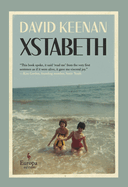
Xstabeth by David Keenan (For the Good Times) is a daring experiment that questions what fiction can and should be. The plot revolves around a trio of characters: Aneliya, her hapless musician father and her father's more successful--and much more debauched--musician friend. Aneliya is caught between her father's naïveté and his best friend's cynicism, each representing distinct poles of artistic and commercial ambition. The novel takes a turn for the metaphysical when her father's music conjures a mysterious presence known as Xstabeth.
Xstabeth is not shy about its eccentricities. Readers will know what they're in for as soon as they get a look at Keenan's stutter-step prose: "Nick Drake said fame was like a fruit tree. He said. Who needs it. That made no sense to me. Surely everyone could use a fruit tree. Free fruit. It's not exactly hard cash. But still." Keenan's stylistic experimentation goes hand in hand with the novel's playfulness and humor, which is particularly apparent in self-deprecating interstitial chapters where invented scholars supposedly dissect Xstabeth in search of its true meaning. The chapters often seem to mock the very idea that the novel has a clear purpose or message to convey, and instead frequently go off on bizarre tangents, exploring the nature of symbolism, or the relationship between memory and mRNA.
Despite the novel's enjoyably mischievous aspects, Xstabeth is not simply an exercise in metatextual irony. There is something heartbreakingly sympathetic in Aneliya's affection for her father, a man who seems almost too pure and earnest for this world. Xstabeth is a surprisingly sincere novel that pushes the boundaries of fiction. --Hank Stephenson, the Sun magazine, manuscript reader

